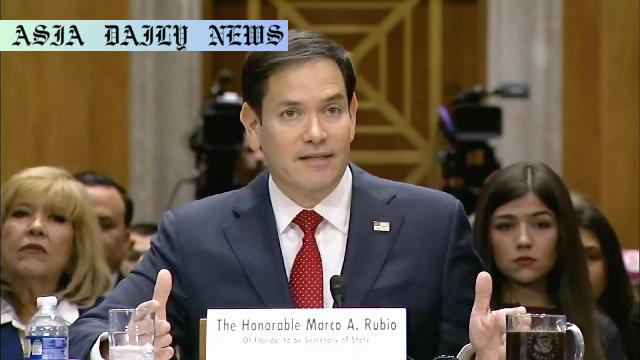Ukraine: US open to restarting talks when Kyiv is prepared for peace negotiations.
- Rubio indicates willingness for US-Ukraine negotiations post-Zelenskyy-Trump tension.
- Emphasizes the importance of convincing Putin for dialogue on peace.
- Urges Ukraine to reflect on potential leadership and negotiation approaches.

US Perspective on Reengaging Ukraine in Peace Talks
US Secretary of State Marco Rubio addressed critical developments regarding the United States’ diplomatic engagements with Ukraine. This follows the intense fallout between Ukrainian President Volodymyr Zelenskyy and former US President Donald Trump during recent discussions. Rubio emphasized that the US is committed to fostering peace and would resume conversations when Ukraine exhibits readiness to negotiate. Despite his intentions, Rubio expressed confusion and disappointment at Zelenskyy’s apparent disruptive behavior, which he fears may hinder progress in key talks.
Rubio pointed out the necessity of bringing Russian President Vladimir Putin to the negotiating table, expressing clear intentions to resolve the conflict diplomatically. The United States, in Rubio’s view, believes that persuading Russia into constructive dialogue is paramount to ensuring long-term stability in the region. He cautioned Zelenskyy about actions that could potentially derail these efforts, suggesting disappointment with Kyiv’s strategic decisions. The Secretary of State underscored that the ball is in Ukraine’s court to initiate discussions centered on peace and compromise.
The Importance of Ukraine’s Willingness to Negotiate
Rubio’s statements paint a larger picture of complexities involved in international peace negotiations, particularly with nations in conflict. For Ukraine, its readiness and ability to make peace could mark a turning point in its future trajectory. However, the underlying tension among stakeholders raises pertinent questions about leadership and alignment.
US House Speaker Mike Johnson’s remarks add another layer to the dialogue. Johnson hinted at the possibility of alternative leadership within Ukraine if Zelenskyy continues to resist or fails to ‘come to his senses.’ Such statements might strain relations further between the two allied nations. Nevertheless, Johnson described his perspective as one necessitating change—whether in Zelenskyy’s approach or Ukraine’s governance overall—aiming to revitalize negotiation efforts.
Diplomacy: The Path Forward
The path to peace in Ukraine is undoubtedly complex. The US, while committed to aiding its ally, appears cautious in escalating diplomatic rifts. Efforts to pressure President Putin to come to the table reflect a balanced stance in a conflict that continues to ravage the region. For Ukraine, maintaining healthy alliances with key partners like the US is equally vital.
Future developments could hinge on Zelenskyy reevaluating his position, not merely for Ukraine’s benefit but also to align with global efforts in mediating the crisis. The current discourse could set a precedent for how allied nations handle tensions amid conflict, offering lessons in diplomacy, patience, and compromise.
As the world watches this fragility unfold, the emphasis on restoring balance through communication rather than confrontation remains integral. Whether Ukraine rises to meet these diplomatic expectations or faces challenges in its leadership decisions will significantly influence its political and socio-economic future in the coming years.



Commentary
Addressing Rubio’s Proposals for Peace
Marco Rubio’s remarks emphasize a strategic yet challenging path forward for peace talks involving Ukraine. His commentary resonates strongly within the current geopolitical momentum, urging nations to engage tactfully while navigating complex diplomatic channels. What stands out, however, is Rubio’s candid admission of being puzzled by Ukraine’s approach, particularly in its uneasy interactions with the US. This sentiment speaks volumes about the fragility of alliances, even between historically supportive nations like the United States and Ukraine.
Reflecting on the tense exchange between Zelenskyy and Trump, it’s evident how personal dynamics influence international diplomacy. Rubio’s response, prioritizing long-term peace over temporary discord, rightly shifts focus to Ukraine’s readiness for negotiations. This pragmatic approach reinforces a broader message—success in geopolitics often depends on a clear, unified direction among allies. Ukraine’s role in prioritizing diplomatic avenues instead of confrontational stances will shape regional stability.
Global Leadership: Shaping Future Cooperation
Equally compelling is US House Speaker Mike Johnson’s direct commentary on Zelenskyy’s leadership and its implications. While Johnson’s stance might appear stern, it reflects real concerns within global leadership circles about Ukraine’s broader strategy. Johnson calls for either a shift in mindset by Zelenskyy or the possibility of changing leadership altogether. Such statements should not be viewed as a threat, but rather as a pivotal reflection point for Zelenskyy and his government.
The question of Ukrainian readiness is not just symbolic—leadership that aligns with allies and prioritizes peace could redefine its standing globally. As nations continue to deliberate the next steps, Ukraine finds itself at the intersection of opportunity and challenge. Rubio’s intent to pursue negotiations and avoid disruptions offers valuable advice for the road ahead.